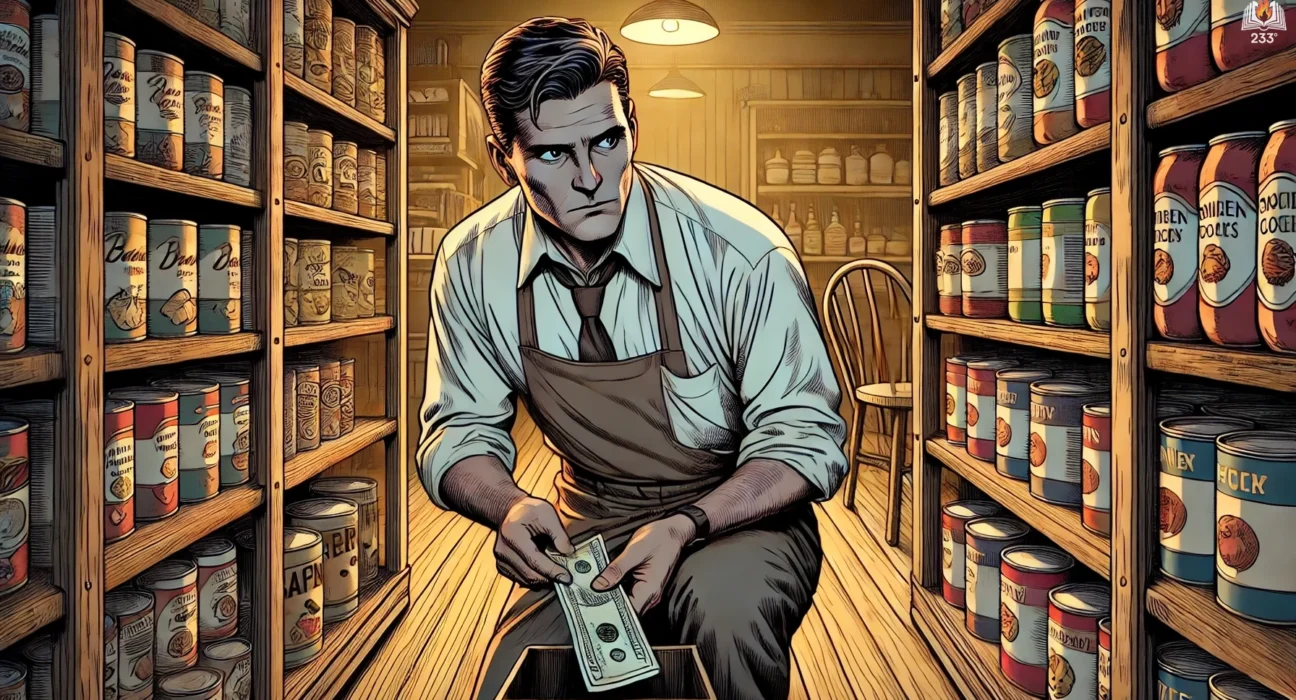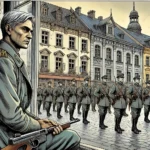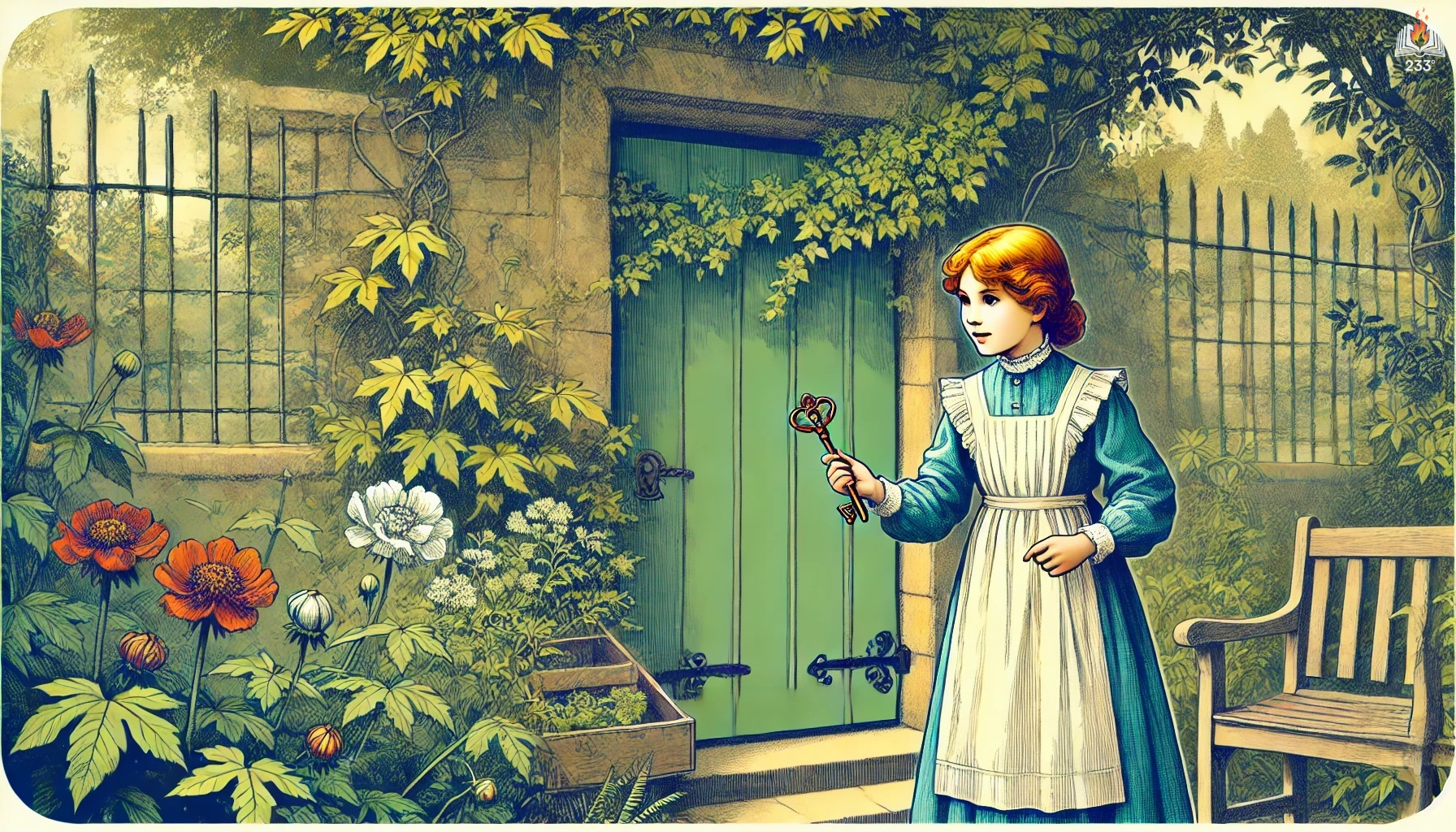The Winter of Our Discontent by John Steinbeck, published in 1961, is a poignant exploration of morality, ambition, and identity in mid-20th-century America. The story follows Ethan Allen Hawley, a man grappling with the decline of his family’s wealth and status, as he navigates ethical dilemmas in pursuit of prosperity and self-worth. Set in the fictional New Baytown, the novel examines the cost of personal and societal compromise in the face of changing values.
Plot Summary
Ethan Allen Hawley begins his day in New Baytown, a once-thriving harbor town now dulled by the slow creep of modernity and shifting fortunes. Ethan, a descendant of sea captains and wealthy merchants, has fallen far from his ancestral prestige. Once the owner of a thriving grocery store, he now works as a clerk in the very same establishment, which has been bought by an immigrant named Marullo. Beneath Ethan’s affable demeanor lies a reservoir of resentment, self-doubt, and a gnawing desire to restore his family’s lost stature.
As he sweeps the store sidewalk, exchanges pleasantries with customers, and banters with his wife, Mary, Ethan’s discontent simmers under the surface. Mary, hopeful and trusting, believes in Ethan’s potential and eagerly tells him about a fortune Margie Young-Hunt, her enigmatic friend, read for her in cards. Margie predicted that Ethan would soon achieve wealth and importance. Ethan dismisses this as fanciful nonsense, though Margie’s sly flirtations and cryptic comments linger in his thoughts.
The Hawleys’ children, Allen and Ellen, are ensnared in their own ambitions. They are preparing to enter a patriotic essay contest with prizes that promise prestige and a trip to Washington, D.C. Their enthusiasm brings a flicker of pride to Ethan, yet he recognizes in their eagerness a reflection of society’s growing obsession with recognition and reward.
Ethan’s routine is interrupted by encounters that test his moral compass. Marullo, the store’s owner, admonishes Ethan for his soft approach to business, urging him to adopt ruthless practices to survive. Joey Morphy, a gregarious bank teller, offers light-hearted yet cynical commentary on the state of the world, while a salesman named Biggers tempts Ethan with an under-the-table kickback scheme. These interactions swirl in Ethan’s mind, challenging his steadfast adherence to principles instilled by his New England heritage.
At home, Ethan wrestles with the weight of his family’s financial struggles. Mary’s innocent dreams of prosperity and her trust in Margie’s fortune-telling compound his guilt. Memories of his father’s downfall and the legacy of the Hawley name press down on him, and he begins to consider the possibility of breaking free from his self-imposed shackles of honor and integrity.
One day, Ethan devises a plan that will restore his fortunes. He learns that Marullo may have immigration issues that could force him to leave the country. Ethan contemplates using this information to take over the store. Though he knows the act would betray Marullo’s trust, the allure of reclaiming his family’s rightful place in the town is too strong to ignore. Simultaneously, he schemes to frame a rival for a bank robbery, further contemplating actions that would have been unthinkable to the man he once was.
As Ethan navigates this moral labyrinth, his relationship with Margie grows increasingly fraught. Her insinuations and seductive manner create an undercurrent of tension that threatens to destabilize his marriage. Margie knows more than she reveals, her cryptic remarks suggesting that she sees through Ethan’s façade. Despite her outward cheer, her presence is a reminder of the compromises Ethan is poised to make.
Ethan’s plan begins to take shape when he discovers a hidden sum of cash in the store. Instead of turning it over to Marullo, he hides it, rationalizing his theft as a small step toward reclaiming his destiny. His actions weigh heavily on him, but the thought of his family’s future pushes him forward. Ethan resolves to protect them at any cost, even if it means sacrificing his own moral integrity.
Meanwhile, the patriotic essay contest brings unexpected turmoil. Ethan discovers that Allen has plagiarized parts of his submission. Confronting his son, he sees a reflection of his own compromises. The realization strikes him deeply—his actions are not isolated but ripple through his family, shaping the very values he once sought to uphold. Yet, he cannot bring himself to reprimand Allen with the same vigor he applies to his own self-judgment.
The turning point arrives when Marullo, seemingly unaware of Ethan’s betrayal, announces that he is gifting the store to Ethan as a reward for his years of loyalty and hard work. The gesture shatters Ethan, leaving him unable to reconcile the generosity of a man he had plotted against with his own duplicity. The weight of his deeds becomes unbearable as he confronts the moral abyss he has descended into.
In the final moments, Ethan stands on the precipice of despair. He walks to the shore, the waves crashing against the rocks, mirroring the tumult within him. He clutches a talisman given to him by Ellen, a symbol of purity and hope. As he considers the possibility of ending his torment, a glimmer of humanity pulls him back. Ethan realizes that while he may have faltered, there is still a path to redemption—not through wealth or status, but through the small, everyday acts of integrity that once defined him.
Ethan returns home, battered but not broken, resolved to rebuild his life on a foundation of honesty, however humble. The Hawley name may never again command the respect it once did, but Ethan grasps the simple truth: the worth of a man lies not in his ambitions but in the quiet strength of his character.
Main Characters
Ethan Allen Hawley: A grocery clerk and the novel’s protagonist, Ethan is a complex figure torn between his ancestral pride and the pressures of modern materialism. His journey explores his moral struggles as he faces temptations that challenge his integrity.
Mary Hawley: Ethan’s supportive but sometimes naïve wife, Mary desires social respectability and financial security. Her faith in Ethan and their future adds emotional weight to his decisions.
Margie Young-Hunt: A charismatic and manipulative widow, Margie introduces an element of intrigue. She stirs unrest in Ethan’s life with her flirtations and fortune-telling, which seem to hint at deeper truths.
Mr. Marullo: Ethan’s Italian immigrant employer, Marullo, owns the grocery store where Ethan works. He is pragmatic and teaches Ethan hard truths about business, becoming a figure of both guidance and tension.
Allen and Ellen Hawley: Ethan’s children, Allen and Ellen represent the next generation’s aspirations and ethical dilemmas. Allen’s pursuit of a writing contest symbolizes hope but also raises questions about authenticity and ambition.
Joey Morphy: A bank teller and Ethan’s acquaintance, Joey provides cynical commentary on modern ethics, offering a contrasting perspective to Ethan’s struggles.
Theme
Morality and Ethical Compromise: The novel scrutinizes the fine line between ambition and betrayal. Ethan’s moral decline highlights the personal and societal costs of prioritizing material success over integrity.
Legacy and Ancestry: Ethan is haunted by the shadow of his family’s proud past, grappling with what it means to honor his heritage while forging a path in a world that values wealth over character.
Materialism and the American Dream: Steinbeck critiques the evolving American Dream, portraying it as a pursuit that often undermines genuine human connections and moral values.
Isolation and Alienation: Ethan’s internal battles and the lack of meaningful connection with others reflect the loneliness that accompanies self-doubt and moral compromise.
Illusion and Reality: Through fortune-telling and the characters’ conflicting desires, Steinbeck explores the deceptive nature of appearances and the allure of easy solutions.
Writing Style and Tone
Steinbeck employs a masterful blend of lyrical prose and sharp realism. His descriptions of New Baytown evoke a vivid sense of place, with lush imagery that contrasts the town’s idyllic appearance with its moral decay.
The tone is introspective and somber, tinged with irony and moments of biting humor. Steinbeck’s narrative voice delves into the psychological complexity of his characters, especially Ethan, to reveal the subtle tensions between societal expectations and individual conscience. Dialogues are crafted to reveal character motivations and expose underlying themes, while the pacing builds an atmosphere of quiet suspense as Ethan’s choices unfold.
We hope this summary has sparked your interest and would appreciate you following Celsius 233 on social media:
There’s a treasure trove of other fascinating book summaries waiting for you. Check out our collection of stories that inspire, thrill, and provoke thought, just like this one by checking out the Book Shelf or the Library
Remember, while our summaries capture the essence, they can never replace the full experience of reading the book. If this summary intrigued you, consider diving into the complete story – buy the book and immerse yourself in the author’s original work.
If you want to request a book summary, click here.
When Saurabh is not working/watching football/reading books/traveling, you can reach him via Twitter/X, LinkedIn, or Threads
Restart reading!








